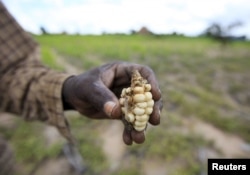Aid agencies are gearing up to help millions of people in southern Africa survive one of the driest years in more than three decades.
The United Nations says 14 million people across southern Africa do not know where their next meals are coming from. It says 2.5 million people are in crisis and require urgent humanitarian assistance.
The region is in the grip of an intense drought, driven by one of the strongest El Nino climate events of the last 50 years. El Nino produces extreme drought and acute water shortages in some parts of the world and heavy rainfall and flooding in others.
Lack of rain across southern Africa has caused long delays in planting and has resulted in widespread crop failure. World Food Program spokeswoman Bettina Luescher told VOA that people have struggled to cope with the losses.
“They eat fewer and smaller meals," she said. "They take their children out of school so the children can get little jobs and somehow help their families to make some money and try to get some food. They sell off their animals, their livestock, at really low prices. And we have also seen — for example, in Malawi — that there are more and more children being admitted to nutrition centers run by the aid agencies.”
People in Western countries spend, on average, 15 percent of their incomes on food. In developing countries, people typically spend up to 60 percent of their incomes. And now, because of the food scarcity, prices are soaring.
The U.N. reports the drought has worsened this situation to such an extent that people can hardly afford to buy even the bare minimum. For example, Luescher said, the cost of maize in southern Malawi has gone up by 175 percent.
“So, you have poor harvests last year, the prospect of a bad harvest this year and El Nino lasting into the next year," she said. "The situation is tough.”
Luescher says the WFP has been pre-positioning food in warehouses so it has a stock on hand to help people who are on their last legs. She said people often are given cash vouchers to buy food if it is available in the market.
She said the WFP also works with governments to give farmers the tools they need to better withstand crises.









